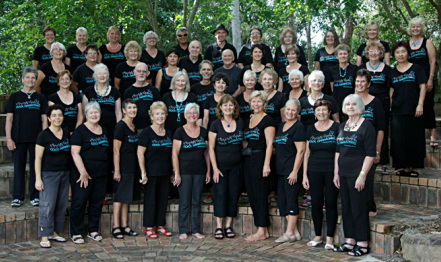Links
|
A Capella Central A central resource for all things a cappella in Australia - information about choirs and groups, how to get in touch with, when and where they will be performing. KwaYa (Swahili for choir) was founded by Marsha Gusti to create a space for Australia's singers to come together and share song. Brian Martin Music Brian's love for the sound of the human voice and rhythms of the world afford him the dynamic style that has been experienced by many throughout his musical career. Emma Creed After many years of teaching music to individuals and groups, Emma knows the magic that music is and loves to create a space for people to immerse and surround themselves with gentle and joyous vibrations to sing and play to their heart’s content. Sunshine Coast Choral Society Since its establishment in 1994 by the late Neil Atkinson, the choir has given many stirring performances, won many awards and established itself as a Sunshine Coast icon. Making Music Being Well An initiative all about celebrating the links between making music and feeling good! Music. Play for Life The Music Council of Australia's grassroots campaign to get more Australians making music: in schools, communities, everywhere. Australian Music Therapy Association offers support and professional development for Registered Music Therapists, and general membership to anyone with an interest in music therapy. Choir of Hope & Inspiration (formerly known as the Choir of Hard Knocks) began rehearsing in September 2006 under the leadership of Founding Music Director, Dr Jonathon Welch AM. The African Children's Choir More than 1000 vulnerable children have been through the Choir program and the funds they have generated have provided the opportunity of education and hope for many more thousands like them in some of the most desperate and needy areas of Africa. A Capella Music & Theatre provides information about the history of a capella and links to other interesting music sites. |
Research: Community Choirs in AustraliaReading music is a useful skill in almost two thirds of community choirs but in 92% of choirs it’s not essential, and four out of five have an ‘open door’ policy with no audition process, according to a report by Music Council of Australia’s Music in Communities Network. Read more...
Choir singers synchronize heartbeats
When members of a choir get together, they do more than harmonize their voices. Singing demands certain breathing patterns, and as breathing becomes coordinated, heart rates follow. Read more...
This (singing) lifeOur good friend Jane Becktel from NSW shares her insights about how newcomers feel when they first join a choir.
Jane came and had a play with Cool Harmonies when we were based at the Coolum Community Centre and was one of the facilitators at our first Peer Sing. Click on the link below to read Jane's article in The Australian.
A curious feeling of transcendenceCorporate singing can create a transcendent feeling of hyper-connectedness. Whatever it is, it’s the opposite of loneliness.
This is why people leave a great rock concert gushing with enthusiasm, ebullient with a feeling of joy and connectedness. Singing loudly together with lots of people (especially thousands, like at U2 concerts) speaks to us on an emotional level. Source: PubMed Neuroscience, oxytocin and singing Where does this feeling come from and why do we have it when we sing together? An entire branch of the neuroscience community studies the effects of music on the brain, trying to answer questions like this one. If you research a bit, one of the first answers you’ll find for our question is oxytocin. Oxytocin, (not to be confused with Oxycontin, the pain-killing drug) is a hormone produced by the human brain that contributes to feelings of trust for the people around you. It is most well known for its role in sexual behavior – Oxytocin levels are high after orgasm, leading people to feel tremendously bonded together with their partner. It’s a bit like neurochemical soul glue. According to Daniel Levitin, author of This is Your Brain on Music, sex isn’t the only thing that leads to high levels of oxytocin. What’s the other? Singing, particularly singing with other people, causes the brain to produce unusually high levels of oxytocin. A study at the National Center for Biotechnology Information that lends credibility to this claim: when people sing together, their brains make oxytocin, and that makes them feel trust, solidarity, and connectedness with the people around them. Source: PubMed Why aren't we singing?Richard Gill OAM presents the annual ABC Classic FM Music Makers Address, in which he talks of the joy of singing, the importance of imagination and the inspiration that music education can bring to all ages.
A major concern of his is that we have almost lost the joy of singing. Click here to listen. | ||

